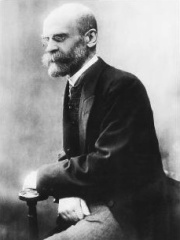

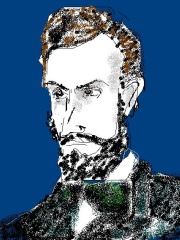
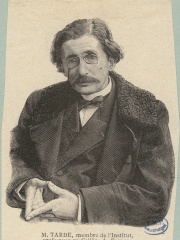
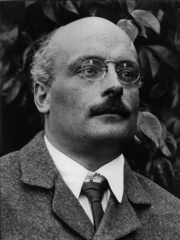
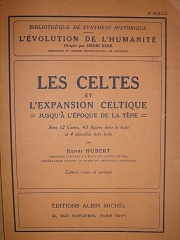
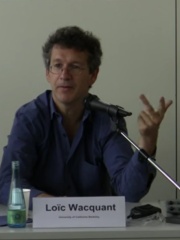

The Most Famous
SOCIOLOGISTS from France
This page contains a list of the greatest French Sociologists. The pantheon dataset contains 79 Sociologists, 9 of which were born in France. This makes France the birth place of the 3rd most number of Sociologists behind United States, and Germany.
Top 9
The following people are considered by Pantheon to be the most legendary French Sociologists of all time. This list of famous French Sociologists is sorted by HPI (Historical Popularity Index), a metric that aggregates information on a biography's online popularity.

1. Émile Durkheim (1858 - 1917)
With an HPI of 85.14, Émile Durkheim is the most famous French Sociologist. His biography has been translated into 100 different languages on wikipedia.
David Émile Durkheim (; French: [emil dyʁkɛm] or [dyʁkajm]; 15 April 1858 – 15 November 1917) was a French sociologist. Durkheim formally established the academic discipline of sociology and is commonly cited as one of the principal architects of modern social science, along with both Karl Marx and Max Weber. Much of Durkheim's work concerns the inability of societies to maintain their integrity and coherence in modernity, an era in which traditional social and religious ties are much less universal, and in which new social institutions have come into being. Durkheim's conception of the scientific study of society laid the groundwork for modern sociology. He used such scientific tools as statistics, surveys, and historical observation in his analysis of suicides in Roman Catholic and Protestant groups. Durkheim's first major sociological work was De la division du travail social (1893; The Division of Labour in Society), followed in 1895 by Les Règles de la méthode sociologique (The Rules of Sociological Method). Also in 1895 Durkheim set up the first European department of sociology and became France's first professor of sociology. Durkheim's seminal monograph, Le Suicide (1897), a study of suicide rates in Roman Catholic and Protestant populations, pioneered modern social research, serving to distinguish social science from psychology and political philosophy. In 1898, he established the journal L'Année sociologique. Les formes élémentaires de la vie religieuse (1912; The Elementary Forms of the Religious Life) presented a theory of religion, comparing the social and cultural lives of aboriginal and modern societies. Durkheim was preoccupied with the acceptance of sociology as a legitimate science. Refining the positivism originally set forth by Auguste Comte, he promoted what could be considered as a form of epistemological realism, as well as the use of the hypothetico-deductive model in social science. For Durkheim, sociology was the science of institutions, understanding the term in its broader meaning as the "beliefs and modes of behaviour instituted by the collectivity," with its aim being to discover structural social facts. As such, Durkheim was a major proponent of structural functionalism, a foundational perspective in both sociology and anthropology. In his view, social science should be purely holistic in the sense that sociology should study phenomena attributed to society at large, rather than being limited to the study of specific actions of individuals. He remained a dominant force in French intellectual life until his death in 1917, presenting numerous lectures and publishing works on a variety of topics, including the sociology of knowledge, morality, social stratification, religion, law, education, and deviance. Some terms that he coined, such as "collective consciousness", are now also used by laypeople.

2. Pierre Bourdieu (1930 - 2002)
With an HPI of 78.90, Pierre Bourdieu is the 2nd most famous French Sociologist. His biography has been translated into 68 different languages.
Pierre Bourdieu (UK: , US: ; French: [pjɛʁ buʁdjø]; Gascon: Pèir Bordièu; 1 August 1930 – 23 January 2002) was a French sociologist and public intellectual. Bourdieu's contributions to the sociology of education, the theory of sociology, and sociology of aesthetics have achieved wide influence in several related academic fields (e.g. anthropology, media and cultural studies, education, popular culture, and the arts). During his academic career he was primarily associated with the School for Advanced Studies in the Social Sciences in Paris and the Collège de France. Bourdieu's work was primarily concerned with the dynamics of power in society, especially the diverse and subtle ways in which power is transferred and social order is maintained within and across generations. In conscious opposition to the idealist tradition of much of Western philosophy, his work often emphasized the corporeal nature of social life and stressed the role of practice and embodiment in social dynamics. Building upon and criticizing the theories of Karl Marx, Sigmund Freud, Max Weber, Émile Durkheim, Claude Lévi-Strauss, Erwin Panofsky and Marcel Mauss among others, his research pioneered novel investigative frameworks and methods, and introduced such influential concepts as the cultural reproduction, the habitus, the field or location, symbolic violence, as well as cultural capital, social capital, and symbolic capital (as distinct from traditionally recognized economic forms of capital). Another notable influence on Bourdieu was Blaise Pascal, after whom Bourdieu titled his Pascalian Meditations. Bourdieu was a prolific author, producing hundreds of articles and three dozen books, nearly all of which are now available in English. His best-known book is Distinction: A Social Critique of the Judgment of Taste (1979), in which he argues that judgments of taste are acts of social positioning. The argument is put forward by an original combination of social theory and data from quantitative surveys, photographs and interviews, in an attempt to reconcile difficulties such as how to understand the subject within objective structures. In the process, Bourdieu attempts to reconcile the influences of both external social structures and subjective experience on the individual. The book was named "the sixth most important sociological work of the twentieth century" by the International Sociological Association (ISA). Pierre Bourdieu's work emphasized how social classes, especially the ruling and intellectual classes, preserve their social privileges across generations despite what he called a myth that contemporary post-industrial society boasts equality of opportunity and high social mobility, achieved through formal education.

3. Marcel Mauss (1872 - 1950)
With an HPI of 72.56, Marcel Mauss is the 3rd most famous French Sociologist. His biography has been translated into 42 different languages.
Marcel Israël Mauss (French: [mos]; 10 May 1872 – 10 February 1950) was a French sociologist and anthropologist known as the "father of French ethnology". The nephew of Émile Durkheim, Mauss, in his academic work, crossed the boundaries between sociology and anthropology. Today, he is perhaps better recognised for his influence on the latter discipline, particularly with respect to his analyses of topics such as magic, sacrifice and gift exchange in different cultures around the world. Mauss had a significant influence upon Claude Lévi-Strauss, the founder of structural anthropology. His most famous work is The Gift (1925).

4. Gabriel Tarde (1843 - 1904)
With an HPI of 70.66, Gabriel Tarde is the 4th most famous French Sociologist. His biography has been translated into 34 different languages.
Jean-Gabriel (de) Tarde (; French: [taʁd]; 12 March 1843 – 13 May 1904) was a French sociologist, criminologist and social psychologist who conceived sociology as based on small psychological interactions among individuals (much as if it were chemistry), the fundamental forces being imitation and innovation.
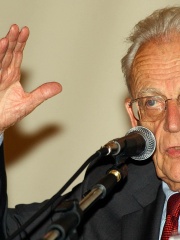
5. Alain Touraine (1925 - 2023)
With an HPI of 68.02, Alain Touraine is the 5th most famous French Sociologist. His biography has been translated into 32 different languages.
Alain Touraine (French: [alɛ̃ tuʁɛn]; 3 August 1925 – 9 June 2023) was a French sociologist. He was research director at the École des Hautes Études en Sciences Sociales, where he founded the Centre d'étude des mouvements sociaux. Touraine was an important figure in the founding of French sociology of work after World War II and later became a sociologist of social movements, particularly the May 68 student movement in France and the Solidarity trade-union movement in communist Poland.

6. Marcel Granet (1884 - 1940)
With an HPI of 60.16, Marcel Granet is the 6th most famous French Sociologist. His biography has been translated into 17 different languages.
Marcel Granet (French: [ɡʁanɛ]; 29 February 1884 – 25 November 1940) was a French sociologist, ethnologist and sinologist. As a follower of Émile Durkheim and Édouard Chavannes, Granet was one of the first to bring sociological methods to the study of China. Granet was revered in his own time as a sociological sinologist, or sinological sociologist, and member of the Durkheimian school of sociology.

7. Henri Hubert (1872 - 1927)
With an HPI of 55.93, Henri Hubert is the 7th most famous French Sociologist. His biography has been translated into 15 different languages.
Henri Hubert (23 June 1872 – 25 May 1927) was a French archaeologist and sociologist of comparative religion who is best known for his work on the Celts and his collaboration with Marcel Mauss and other members of the Année Sociologique.

8. Loïc Wacquant (b. 1960)
With an HPI of 55.72, Loïc Wacquant is the 8th most famous French Sociologist. His biography has been translated into 24 different languages.
Loïc J. D. Wacquant (French: [lo'ik va'kɑ̃]; born 1960) is a French sociologist specializing in urban sociology, urban poverty, racial inequality, the body, social theory and ethnography. Wacquant is a professor of sociology at the University of California, Berkeley, where he is affiliated with the Center for the Study of Law and Society, the Global Metropolitan Studies Program, the Institute of Governmental Studies, and the Center for Ethnographic Research. He is also a research associate at the Centre européen de sociologie et de science politique (CESSP) in Paris and an organizer of the Ethnographic Café. Wacquant's research has been recognized with several awards. He was elected a Junior Fellow of the Harvard Society of Fellows for the term 1990–1993. In 1997, he was awarded a MacArthur Fellowship. In 2006, he was granted an Alphonse Fletcher Sr. Fellowship. Wacquant won the Lewis A. Coser Award of the Theory Section of the American Sociological Association in 2009. Wacquant is the only sociologist of note to have competed in the Chicago Golden Gloves amateur boxing tournament. The then 29-year-old 5-foot-81⁄2 Frenchman, nicknamed "Busy Louie" and weighing in at 137 lbs, suffered a decision loss in a light-welterweight contest at Saint Andrew's Gym in 1990. Wacquant received a standing eight count in the first round.

9. Ève Chiapello (b. 1965)
With an HPI of 44.57, Ève Chiapello is the 9th most famous French Sociologist. Her biography has been translated into 14 different languages.
Ève Chiapello (born 1965) is Professor at the École des hautes études en sciences sociales (EHESS), Paris, where she holds a chair in the "sociology of the transformation of capitalism". She has published numerous articles and books, including Artists Versus Managers (1998) and The New Spirit of Capitalism (French original 1999, with Luc Boltanski), translated into nine languages including English (2005).
People
Pantheon has 9 people classified as French sociologists born between 1843 and 1965. Of these 9, 2 (22.22%) of them are still alive today. The most famous living French sociologists include Loïc Wacquant, and Ève Chiapello. The most famous deceased French sociologists include Émile Durkheim, Pierre Bourdieu, and Marcel Mauss. As of April 2024, 1 new French sociologists have been added to Pantheon including Ève Chiapello.
Living French Sociologists
Go to all RankingsDeceased French Sociologists
Go to all RankingsÉmile Durkheim
1858 - 1917
HPI: 85.14
Pierre Bourdieu
1930 - 2002
HPI: 78.90
Marcel Mauss
1872 - 1950
HPI: 72.56
Gabriel Tarde
1843 - 1904
HPI: 70.66
Alain Touraine
1925 - 2023
HPI: 68.02
Marcel Granet
1884 - 1940
HPI: 60.16
Henri Hubert
1872 - 1927
HPI: 55.93
Newly Added French Sociologists (2025)
Go to all RankingsOverlapping Lives
Which Sociologists were alive at the same time? This visualization shows the lifespans of the 7 most globally memorable Sociologists since 1700.

